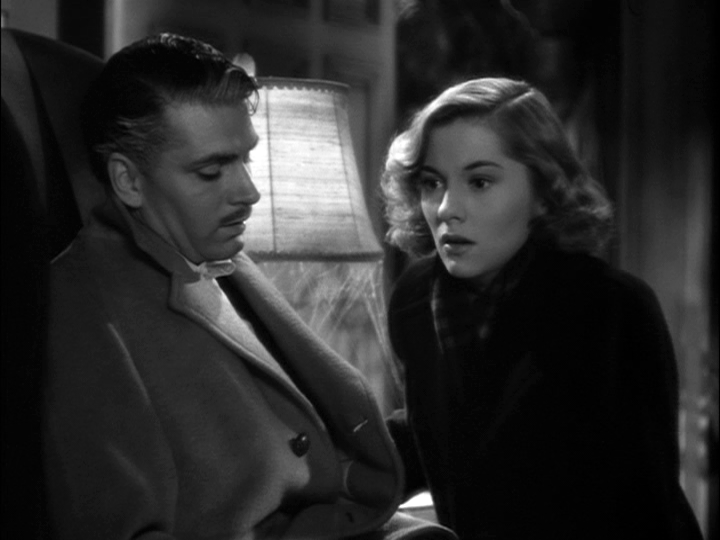Rebecca, 1940, United Artists. Starring Joan Fontaine, Laurence Olivier. Co-starring Judith Anderson, George Sanders. Directed by Alfred Hitchcock. B&W, 130 minutes.
A naïve young woman of lowly means (Joan Fontaine), whose lack of confidence keeps her from so much as revealing her name, has met the dashing and wealthy Maxim de Winter (Laurence Olivier), owner of the renowned Manderley estate. The two marry after a whirlwind courtship of only two weeks. It is Maxim’s second marriage; his first wife, Rebecca, tragically drowned in a sailing accident only a year before.
Quite in love, yet unprepared for the demands of her new life, the bride finds her insecurities played upon by both the forbidding and foreboding long-time Manderley housekeeper, Mrs. Danvers (Judith Anderson) and Rebecca’s rakish cousin, Jack Favell (George Sanders). The late Rebecca still has a stronghold on the entire estate, and the new Mrs. de Winter finds herself faltering under it.
An unexpected discovery leads to a shocking revelation, and the newlywed couple teeter on the brink of credibility and consequences.

Laurence Olivier, Joan Fontaine
The first American film directed by Alfred Hitchcock, Rebecca was nominated for 11 Academy Awards, including Best Director, Best Actor and Best Actress. It won two, for Best Picture and Best Cinematography, Black & White.
Based on the now-classic novel of the same name by Daphne du Maurier, the film is true to the book in virtually every way, save for a plot element that was necessary to change to meet Motion Picture Production Code standards. Hitchcock deftly worked that change. It is barely notable in the overall storytelling, and the impact of the story is not lessened.
Fontaine’s performance in particular is noteworthy; the subtle changes in her demeanor tell the bride’s story. While Fontaine had appeared in several films before this time, including small roles in Gunga Din and The Women, this became a breakout role for her. It led to other significant parts, including the lead in Suspicion the following year, for which she won the Oscar.

George Sanders, Joan Fontaine, Laurence Olivier
George Sanders, who made a career of playing incorrigible characters, is pitch perfect as the wicked cousin determined to destroy Maxim. In the process, he plans to take down the second Mrs. de Winter, the woman who replaced his highly favored cousin. And while you feel little sympathy for Mrs. Danvers, the character was given depth by the performance of Judith Anderson. She received an Oscar nomination for Best Supporting Actress.
Hitchcock employed numerous tricks to set the mood for the story, including creating an emphasis on the omniscient presence of Mrs. Danvers in the young wife’s life by rarely showing the older woman walking or moving. She was nearly always seen standing still, seeming to appear out of nowhere, setting the fragile bride on edge in her own home.

Joan Fontaine, Judith Anderson
No less a character in the movie than the fine cast was Manderley, the de Winter estate. According to Hitchcock, the estate seen in its entirety was done in miniature, and was not represented by any existing structure in England or elsewhere.
Producer David O. Selznick stepped in after the initial cut of Rebecca was completed and made numerous changes. While some felt this markedly made the film better, helping capture the moodiness and dark elements of the story, it reportedly did not make Hitchcock happy. As a result, he is said to have changed his directing style after this film. Each scene was shot precisely as he wanted it, and little extra footage was available for further edits.
A taut psychological tale of romance and betrayal, Rebecca is a film that has stood the test of time with its fine performances, artful direction and cinematography. It is a captivating, complex story of the grip an untimely death can have on those left behind.

Such a great film! The entire cast is excellent! Although Hitch never got over Selznick’s meddling, it is still one of the director’s best movies.
LikeLiked by 1 person
I agree totally. I loved the book, and while this is true to that story, it also has a unique aura of Hitchcock filmmaking.
LikeLiked by 1 person
I haven’t had a chance to read the book. I need to remedy my mistake! 🙂
LikeLiked by 1 person
[…] Picture and Best Original Screenplay, but won none. That year’s winner for Best Picture was Rebecca, another Hitchcock […]
LikeLike
[…] her husband’s true nature was subtle and nuanced, reminiscent of her performance in Rebecca a year […]
LikeLike